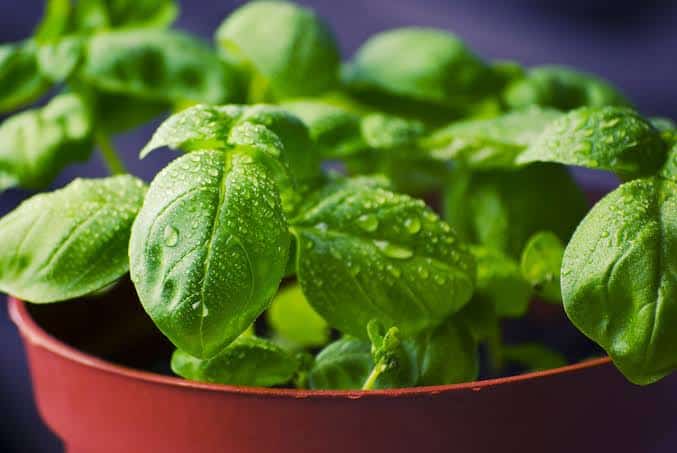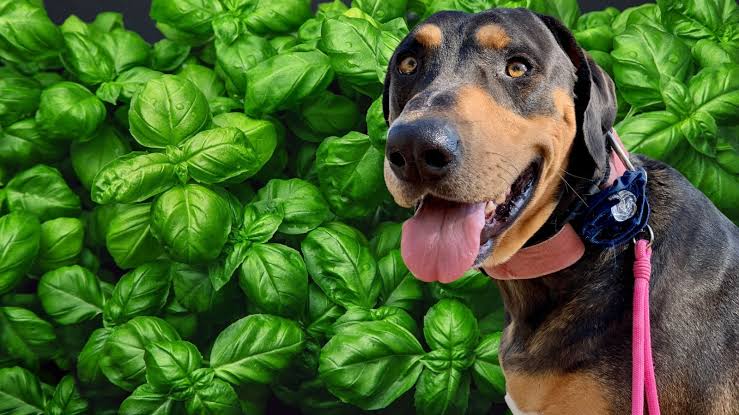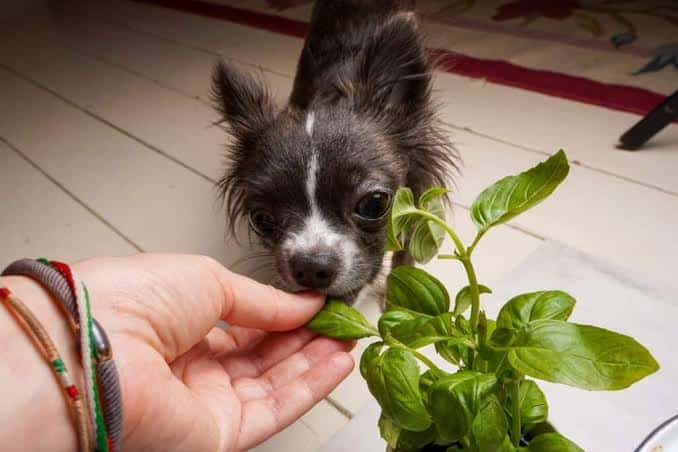Welcome to our exploration into the canine culinary world! In this article, we’ll answer the question “Can Dogs Eat Basil?”. Also, we shall touch some aspects in this article, like; Importance Of Understanding Canine Diets, Nutritional Benefits Of Basil For Dogs, Safety Considerations Of Basil For Dogs, Creative Ways To Include Basil In Dog Meals, etc.
Ensuring our Dogs enjoy a healthy and balanced diet is paramount. Join us as we unravel the nutritional aspects, potential benefits, and any precautions associated with introducing basil into your dog’s menu. Let’s embark on this flavorful journey, prioritizing our pups’ well-being every step of the way.
Recommended: Best Food for Dogs with Allergies

Overview Of A Basil
Basil, scientifically known as Ocimum basilicum, is a fragrant herb that belongs to the mint family. Widely celebrated for its culinary uses, basil is characterized by its distinctive aroma and a rich, sweet taste with a hint of peppery spice. This herb is native to tropical regions but has found its way into various cuisines globally.
Key Characteristics Of Basil
- Varieties: There are numerous basil varieties, each with unique flavors and appearances. Common types include sweet basil, Thai basil, and purple basil.
- Culinary Uses: Basil is a staple in many kitchens, often used fresh in salads, pasta dishes, and as a primary ingredient in pesto. Its aromatic qualities make it a versatile herb, enhancing the flavor profile of diverse culinary creations.
- Nutritional Content: Beyond its culinary appeal, basil boasts a range of essential nutrients, including vitamins A, K, and C, as well as minerals like calcium, iron, and potassium. This nutritional profile has led to a growing interest in exploring its potential benefits for various diets.
- Medicinal Traditions: Basil has a history of traditional medicinal use in different cultures. It is believed to have anti-inflammatory and antioxidant properties, contributing to potential health benefits.
- Cultivation: Basil can be grown in gardens or indoor pots, thriving in well-drained soil and warm, sunny conditions. Its vibrant green leaves make it an attractive addition to both culinary and ornamental gardens.
Recommended: Are Lilies Toxic to Dogs?: Find out How it Affects Thematically

Importance Of Understanding Canine Diets
In the realm of responsible pet ownership, having a grasp of what constitutes a safe and healthy diet for our furry companions is paramount. Dogs, like humans, require a balanced and nutritious diet to thrive. In answering the question, “Can dogs eat basil?” it’s crucial to understand the significance of canine diets.
Balanced Nutrition For Dogs
Dogs, being omnivores, benefit from a diet that encompasses proteins, fats, carbohydrates, vitamins, and minerals. Each element plays a vital role in their overall well-being, influencing everything from energy levels to immune system function.
Unveiling The Nutritional Value Of Basil For Dogs
Basil, known for its aromatic presence in human cuisine, offers more than just flavor. It brings nutritional value to the table for our canine companions as well. Rich in essential nutrients, basil contains vitamins A, K, and C, along with minerals like calcium, iron, and potassium.
- Vitamin A: Vital for maintaining healthy skin, coat, and vision in dogs.
- Vitamin K: Helps the blood to clot properly and improves the health of the bone.
- Vitamin C: In-charge of enhancing the immune system.
- Calcium: Essential for strong bones and teeth.
- Iron: Important for oxygen transport within the body.
- Potassium: Regulates fluid balance and supports heart function.
Understanding these components helps us make informed decisions about integrating basil into our dogs’ diets. However, moderation is key, as excessive consumption may lead to unintended consequences.
Recommended: 5 Toxic Foods To Avoid For Dogs
Nutritional Benefits Of Basil For Dogs
When it comes to our furry companions, ensuring they receive a well-rounded and nutritious diet is a top priority. Basil, often celebrated for its culinary contributions, extends its goodness beyond the human plate to offer various nutritional benefits for dogs.
Rich In Essential Nutrients
- Vitamins:
- Vitamin A: It assists or aids vision, improves a healthy skin and boosts immune function.
- Vitamin K: Aids in blood clotting and a healthy bone.
- Vitamin C: An antioxidant that aids the immune system.
- Minerals:
- Calcium: Crucial for strong bones and teeth.
- Iron: Supports oxygen transport within the body.
- Potassium: Regulates fluid balance and aids heart function.
Antioxidant Properties
Basil boasts powerful antioxidants, such as polyphenols, which combat oxidative stress. In dogs, this can contribute to overall health by neutralizing free radicals and supporting their immune system.
Anti-Inflammatory Potential
Certain compounds in basil, like eugenol, exhibit anti-inflammatory properties. While more research is needed to understand its specific impact on dogs, this property may offer potential benefits for canine joint health.
Aromatic Appeal And Palatability
Beyond its nutritional profile, the aromatic nature of basil can make it an enticing addition to a dog’s diet. Enhancing the flavor of meals, basil may encourage picky eaters to enjoy their food, promoting better nutrition.
Recommended: List of Dog Safe Flowers

Safety Considerations Of Basil For Dogs
While basil has nutritional merits, understanding potential risks is crucial for responsible pet ownership.
Allergies And Sensitivities
Just like humans, dogs can develop allergies or sensitivities to certain foods, including basil. Pay attention to any signs of allergic reactions such as itching, swelling, or gastrointestinal issues. If observed, consult your veterinarian promptly.
Oxalates And Calcium Content
Basil contains oxalates, compounds that, when consumed in excess, may contribute to the formation of kidney stones. Dogs prone to urinary issues should consume basil in moderation. Additionally, the calcium content in basil, while beneficial, warrants mindful inclusion in dogs with specific health conditions.
Introduce Gradually And Monitor
When introducing basil into your dog’s diet, do so gradually. Sudden dietary changes can upset a dog’s stomach, so a slow and monitored approach ensures a smooth transition.
Avoid Seasonings And Additives
While fresh, plain basil can be a healthy addition, steer clear of basil prepared with seasonings, spices, or additives. Garlic and onions, commonly used in some recipes, can be toxic to dogs. Opt for simple preparations without potentially harmful ingredients.
Recommended: List of Dog Toxic Flowers
Creative Ways To Include Basil In Dog Meals
Elevating your dog’s meals with the aromatic and nutritious touch of basil can be both enjoyable and beneficial. Let’s explore creative and dog-friendly ways to incorporate basil into their diet, ensuring a delightful culinary experience.
A. Fresh Basil as a Garnish:
- Finely chop fresh basil and sprinkle it as a garnish over your dog’s regular meals.
- This simple addition not only enhances the flavor but also introduces the nutritional benefits of basil.
B. Basil-Infused Broths:
- Create a canine-friendly broth by simmering fresh basil leaves in water.
- Once cooled, add a splash of this basil-infused broth to your dog’s food for a flavorful boost.
C. Basil Pesto Treats:
- Craft a dog-friendly pesto by blending fresh basil, dog-safe peanut butter, and a touch of olive oil.
- Use this pesto as a tasty topper for your dog’s dry food or incorporate it into homemade treats.
D. Basil-Infused Ice Cubes:
- Freeze a mixture of water and finely chopped basil to create refreshing basil-infused ice cubes.
- Add these cubes to your dog’s water bowl for a hydrating and flavorful twist.
E. Basil-Flavored Homemade Biscuits:
- Integrate dried basil into homemade dog biscuits for a nutritious and tasty treat.
- Ensure the biscuit recipe aligns with your dog’s dietary needs, using dog-friendly ingredients.
F. Basil and Protein Mix:
- Combine finely chopped basil with lean protein sources like boiled chicken or turkey.
- Mix this flavorful blend with your dog’s regular food to introduce variety and encourage mealtime excitement.
G. Basil and Veggie Medley:
- Create a colorful medley of dog-safe vegetables and toss in fresh basil leaves.
- Steam or lightly cook the veggies and serve this nutritious mix alongside your dog’s main meal.
Recommended: Is Rosemary Safe For Cats? Find out if Rosemary is Poisonous to Cats

Dog-Friendly Basil Recipes
Unlocking the culinary potential of basil for your canine companion goes beyond sprinkling it on regular meals. Let’s dive into some delightful and nutritious dog-friendly recipes that incorporate the aromatic charm of basil.
Basil and Chicken Paw-sicles:
- Blend fresh basil with cooked and shredded chicken.
- Pour the mixture into paw-shaped molds or ice cube trays and freeze.
- Treat your dog to these basil-infused chicken paw-sicles on a hot day for a refreshing snack.
Basil Bliss Biscuits:
- Combine oat flour, finely chopped fresh basil, and an egg to form a dough.
- Cut out biscuit shapes and bake until golden brown.
- These homemade basil bliss biscuits offer a crunchy treat filled with flavor and nutrients.
Canine Caprese Salad:
- Dice dog-friendly vegetables like cherry tomatoes and cucumbers.
- Mix in fresh basil leaves and a small amount of dog-safe cheese.
- Serve this canine caprese salad as a side dish to add variety to your dog’s meals.
Basil-Infused Sweet Potato Delight:
- Boil and mash sweet potatoes, incorporating finely chopped fresh basil.
- Form small portions into bite-sized treats and bake until firm.
- These basil-infused sweet potato delights offer a blend of sweetness and herbal goodness.
Tasty Tuna and Basil Bowls:
- Mix canned tuna (in water) with finely chopped basil.
- Spoon the mixture onto your dog’s regular food for a protein-packed and flavorful addition.
- Ensure the tuna is free from added seasonings or oils that may not be suitable for dogs.
Veggie and Basil Pup Pizza:
- Create a dog-friendly pizza crust using ingredients like chickpea flour.
- Top the crust with diced dog-friendly vegetables and fresh basil.
- Bake until the crust is crisp, offering a fun and nutritious pup pizza.
Basil and Banana Pup Pops:
- Blend ripe bananas with a hint of fresh basil.
- Take out the blended substance into paw-shaped molds. Then refrigerate it.
- Treat your dog to these basil and banana pup pops for a delightful frozen dessert.
Basil and Pumpkin Power Bites:
- Mix canned pumpkin puree with finely chopped fresh basil.
- Form small balls and refrigerate for a cool and nutrient-packed snack.
- These basil and pumpkin power bites provide a tasty combination of flavors.
Recommended: Dog Car Seat: Check out Top 10 Dog Car Seats and How To Fix Them

Veterinary Opinion On Dogs Consuming Basil
Ensuring the well-being of our furry friends involves seeking guidance from veterinary professionals when introducing new elements into their diet. Let’s explore the insights from veterinarians on the topic of dogs consuming basil.
General Veterinary Consensus:
- Nutritional Value Acknowledgment:
- Veterinarians generally acknowledge the nutritional benefits of basil for dogs, praising its vitamin and mineral content.
- Moderation Advisory:
- Most veterinarians emphasize the importance of moderation when incorporating basil into a dog’s diet. Too much of it may create issues with digestion.
Benefits for Certain Health Conditions:
- Anti-Inflammatory Properties:
- Some veterinarians note that basil’s anti-inflammatory properties may be beneficial for dogs with certain health conditions, such as arthritis.
- Potential Immune System Support:
- The antioxidant-rich nature of basil is recognized as a potential support for a dog’s immune system, according to some veterinary opinions.
Individualized Approach:
- Consideration for Specific Dogs:
- Veterinarians highlight the need for an individualized approach, taking into account a dog’s age, breed, size, and existing health conditions.
- Allergy and Sensitivity Assessment:
- Before introducing basil, veterinarians advise assessing a dog’s potential allergies or sensitivities. Any signs of adverse reactions should prompt consultation with a vet.
Caution for Certain Conditions:
- Urinary Concerns:
- Veterinarians caution dog owners with pets prone to urinary issues, as basil contains oxalates that, in excess, may contribute to kidney stones.
- Consultation for Specific Cases:
- Dogs with pre-existing health conditions should have dietary changes, including basil consumption, approved by a veterinarian to ensure compatibility with their treatment plans.
Recommended: Are Lilies Toxic to Dogs?: Find out How it Affects Them
Frequently Asked Questions
Can Dogs Eat Basil Safely?
Yes, dogs can consume basil in moderation. It offers nutritional benefits and can be a flavorful addition to their diet.
What Are The Nutritional Benefits Of Basil For Fogs?
Basil is rich in vitamins A, K, and C, along with minerals like calcium, iron, and potassium.
How Should I Introduce Basil To My Dog’s Diet?
Start by incorporating small amounts gradually. Monitor your dog’s response and ensure they don’t show signs of allergies or sensitivities.
Can Basil Cause Any Health Issues In Dogs?
Dogs prone to urinary problems should consume basil in moderation due to its oxalate content.
Are There Any Parts Of The Basil Plant That Are Harmful To Dogs?
Generally, all parts of the basil plant are safe for dogs. However, always use fresh, plain basil without added seasonings or additives.
How Much Basil Can I Feed My Dog?
The recommended amount depends on your dog’s size and health. As a guideline, start with a small amount, such as a teaspoon, and observe how your dog reacts.
Can Basil Be Given To Dogs With Specific Health Conditions?
Consult your veterinarian before introducing basil to dogs with health conditions. While basil may offer benefits, individual cases vary, and professional advice is crucial.
Conclusion
We just concluded with the topic, “Can Dogs Eat Basil?”.
Basil, with its rich array of vitamins and minerals, can indeed be a wholesome addition to a dog’s meals. However, moderation is paramount, as excessive consumption may lead to unintended health issues. The insights from veterinary professionals emphasize the need for an individualized approach, taking into account factors like a dog’s age, size, and existing health conditions.
Our journey through this topic underscores the importance of consulting with veterinarians before making significant dietary changes for our dogs. Whether it’s introducing basil for its potential anti-inflammatory properties or seeking a creative twist to enhance their meals, the well-being of our furry friends remains at the forefront.

